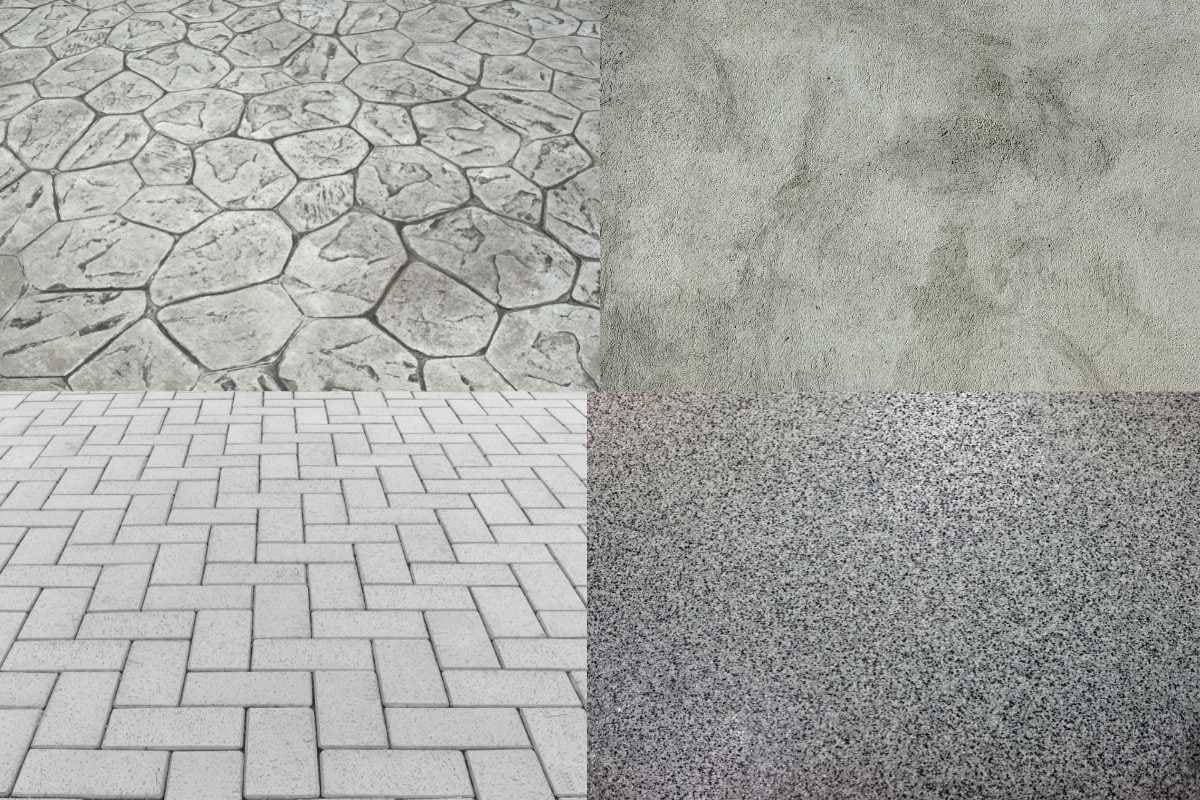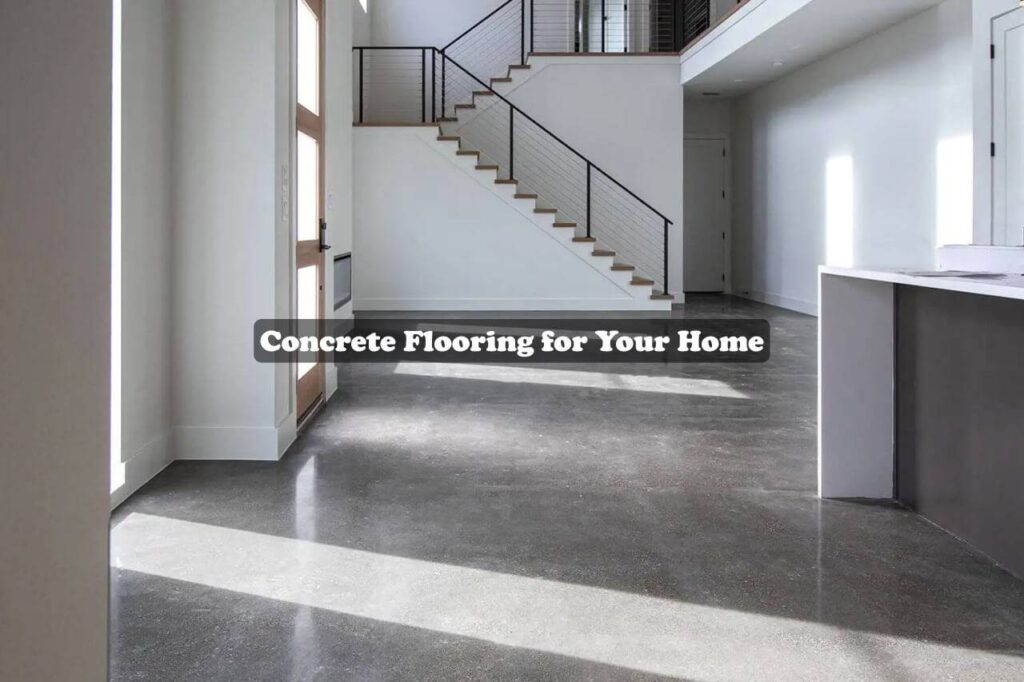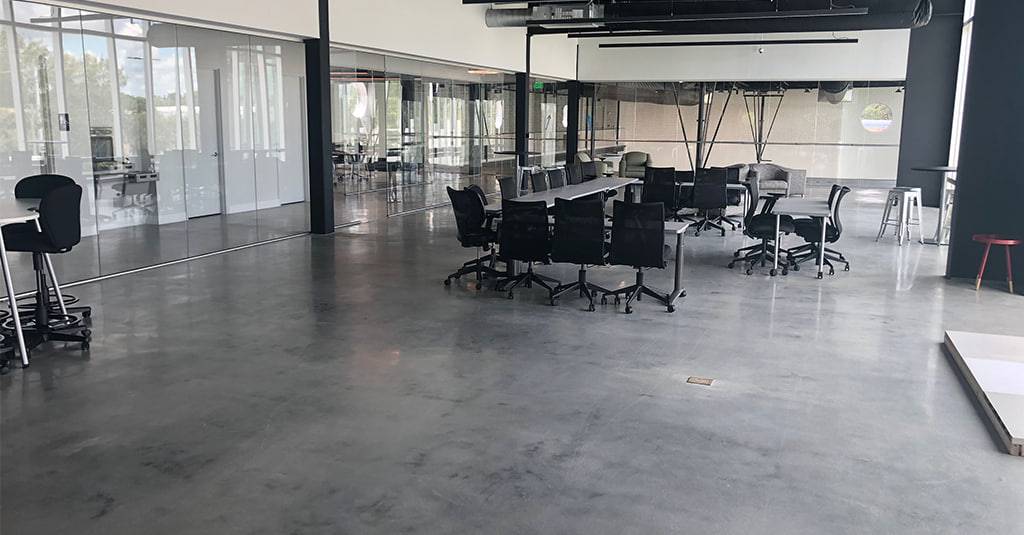As someone who’s lived with concrete flooring in two homes, one DIY and one professionally finished, I understand the appeal and challenges of this unique material. Today, we’ll delve into the pros and cons of concrete floors to help you decide if they’re the right fit for your space.
Concrete Floors: A Blend of Raw and Refined
Sealed concrete floors transform the very foundation of your home into a beautiful and durable flooring solution. This process involves applying a protective sealant to the concrete surface. This enhances its resistance to stains, water, and wear, transforming the raw material into a sleek finished floor.
The beauty of sealed concrete lies in its versatility:
- Natural charm: Embrace the natural grey concrete or,
- Customizable canvas: Choose from a variety of stain colors, often favoring earthy tones like brown.
- Tailored finish: Opt for a glossy shine or a subdued matte look to match your desired aesthetic.
Ideal for high-traffic areas, sealed concrete floors require minimal maintenance. Regular cleaning and occasional resealing ensure they stay beautiful and functional for years to come.
Different Types of Concrete Flooring
 While all hailing from the same foundation, concrete flooring offers a surprising range of aesthetics. Let’s explore the three main types:
While all hailing from the same foundation, concrete flooring offers a surprising range of aesthetics. Let’s explore the three main types:
- Raw Sealed Concrete: Embrace the natural charm of concrete with this affordable option. A clear sealant is applied to the raw surface, providing protection without altering its inherent beauty. This is the type of flooring I use in my home, offering a clean and minimalist aesthetic.
- Stained Concrete: Infuse personality into your space with stained concrete. This process involves applying acid-based or water-based stains before sealing, unlocking a world of unique patterns and color variations. This option elevates the visual appeal of concrete while maintaining its inherent durability.
- Polished Concrete: Step into a world of luxury with polished concrete. This process goes beyond sealing, utilizing specialized tools to grind the concrete surface to a smooth, glossy finish. The resulting shine delivers a sleek and contemporary look, resembling polished stone. While not as common as other options, it offers a unique and sophisticated touch.
Remember, each type comes with its own advantages and considerations. Understanding these distinctions will help you choose the perfect concrete option to complement your style and needs.
Concrete Floor Pros and Cons
Having lived with concrete floors in two homes (DIY and professional), I want to offer a balanced perspective, highlighting both the advantages and drawbacks to help you make an informed decision.
Pros:
- Comfort: Concrete floors are naturally hard and cold, which can be especially noticeable during colder months. While you mention it helps with your Texas heat, consider if additional rugs or slippers are needed for comfort.
- Sound: In open floor plans, the hardness can amplify sound, potentially resembling an echo chamber. This might be a concern if you prioritize a quiet environment.
- Aesthetics: While some find concrete modern and minimalist, you acknowledge it may not suit everyone’s taste and can feel unfinished.
- Customization and control: Staining concrete, in particular, can be unpredictable, and achieving the desired look can be challenging, especially with a DIY approach.
Cons:
- Low maintenance: You rightly emphasize the ease of cleaning. Concrete floors are stain- and water-resistant, require minimal upkeep, and avoid the hassle of grout cleaning.
- Durability: They are incredibly resilient and virtually indestructible, withstanding scratches, cracks, and heavy traffic. This is especially valuable with children or pets around.
- Cost-effective: Concrete flooring is generally cheaper than other options, making it a budget-friendly choice.
Ultimately, the decision of whether concrete floors are right for you depends on your priorities and lifestyle. Weigh the pros and cons carefully, considering your space, visual preferences, and comfort needs. You may find, like me, that the practicality and durability outweigh the drawbacks, making concrete a compelling option despite its unique characteristics.
Taming the Concrete Canvas: Crucial Pre-Planning Tips
Before embarking on the journey of sealed concrete floors, whether DIY or professional, remember: preparation is paramount. Here’s why:
The Importance of Early Planning:
- Communicate your intention: Inform your builder upfront about your desire for sealed concrete floors. This ensures the construction crew takes extra care while building your home.
- Avoid future headaches: If you don’t inform them, they’ll build as if another flooring material will be used, potentially leaving behind imperfections like chipped concrete, spills, and other unavoidable construction mess. These are difficult, if not impossible, to fully remove even with rigorous cleaning, as evidenced by the close-up pictures of my previous home’s floor.
The Challenge of Stained Concrete:
Stained concrete requires even more meticulous pre-planning:
- Unpredictable spills: During construction, spills are inevitable, regardless of precautions. While these might not affect unstained concrete, they can become permanent blemishes on a stained floor.
- Invisible threats: An unseen spill might go unnoticed until the staining process, refusing to accept the color and leaving an unsightly mark. In such cases, covering the floor with another material is often the only solution.
Conclusion
So, you’ve weighed the pros and cons, explored the different types, and learned the importance of planning. Now, are you ready to transform your space with the unique beauty and durability of concrete floors?
Whether you’re drawn to the natural elegance of raw concrete, the customizable charm of stained options, or the luxurious shine of polished surfaces, Dex Flooring can help you achieve your vision. Our team of experts possesses the knowledge and experience to guide you through every step of the process, from initial consultation to expert installation and maintenance.
Contact Dex Flooring today for a free consultation and let us turn your concrete floor dreams into a reality!
FAQs: Unveiling the Secrets of Concrete Floors
Are concrete floors comfortable?
Concrete floors are naturally hard and cool, which can feel uncomfortable underfoot, especially in colder climates. However, adding rugs, slippers, or radiant heating can enhance comfort.
Are concrete floors noisy?
The hardness of concrete can amplify sound, especially in open floor plans. Consider rugs or other sound-absorbing materials if noise is a concern.
How much do concrete floors cost?
Concrete flooring is generally cheaper than other options like hardwood or tile. However, the final cost can vary depending on the type of concrete, desired finish (stained or polished), and labor costs.
Are concrete floors easy to maintain?
Absolutely! Concrete floors are incredibly low-maintenance. They are stain and water-resistant, require minimal cleaning, and don’t need grout maintenance.
Are concrete floors durable?
Concrete floors are incredibly resilient and virtually indestructible. They are resistant to scratches, cracks, and heavy traffic, making them ideal for high-traffic areas and households with pets or children.
Can I DIY a concrete floor?
While possible, DIYing concrete floors can be challenging, especially for achieving a polished finish. It’s recommended to consult with professional contractors to ensure proper installation and avoid potential issues.
What are the best places for concrete floors?
Concrete floors are versatile and can be used in various spaces, including kitchens, living rooms, basements, garages, and even bathrooms. However, they might not be ideal for bedrooms due to their coolness and potential for noise in open floor plans.
How long do concrete floors last?
With proper care and maintenance, concrete floors can last for decades, making them a valuable long-term investment.


